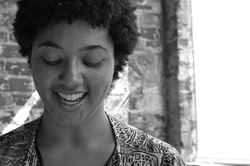 Writers have varying degrees of allegiance with the places they come from, and the places they call home. Someone peripatetic might become obsessed with a number of places, or an expatriate might spend her whole career looking back on the place of her upbringing. For other writers, locale seems to play only a nominal part in their work. Bianca Spriggs is not one of those writers. It's impossible to consider her body of work without also considering the South she calls home. Spriggs talks bourbon and drawl and history - she does it just a little durty, and she does it damn well. I got to know Spriggs when she invited me to participate in the Kentucky Women Writers' Conference in Lexington, but it wasn't until the Affrilachian Poets reading at AWP in 2011 that I got a chance to hear her work at length. She seriously impressed me that night: her work was clear without being simple, bold without being bombastic, with just the right tinge of mystery. And her command of narrative had me swooning. Spriggs' poems have the same subtle touch on the page. She takes great care with line, balancing and breaking brilliantly to round and coax a poem. When I read pieces like the one below, I feel like roads are opening up inside me, inviting me to new parts of myself – parts I'd forgotten – or never realized – were there. I hope she opens you up, too. * Alchemist The woman next door says she don’t have to ask if it was me or him rearranging the furniture last night. Don’t take that much to grow a man the way you want him. She tells me how all a woman had to do to snag her the right man or cure one from being a terror, was to scare up some nightshade. She says it used to be simpler when the world was simpler. Used to be in the South, you could find it just about anywhere on account of how liberal the law was with hanging men. You’d look for the mandrake right where he’d been hung and spasmed the last of his seed into the earth. But she doesn’t say, spasmed his seed. She says something else which means having an orgasm as you die. You had to harvest the plant before dawn on a Friday and you’d sometimes get a four-foot root already bulging into a homunculus. But she doesn’t say, homunculus. She uses a racial slur. Then it’d want feeding. Goat’s milk. Honey. Dried mushroom. Blood from a fresh cut. Eventually that little thing would come to life, start moving around, wail like an infant if it didn’t have its food. When it got adolescent-old you’d slit its throatroot because, after all, it’s just a plant. Dry it out. Grind it down. Serve it in tea to the man you’re wanting to do right and that was that. What do you do now, I want to know, if you don’t have a mandrake? She says, Find someone who do. I know where a whole mess of ‘em grow. * Affrilachian Poet and Cave Canem Fellow, Bianca Spriggs, is a poet and multidisciplinary artist based in Lexington, Kentucky. Bianca is the recipient of a 2013 Al Smith Individual Artist Fellowship in Poetry, multiple grants from the Kentucky Foundation for Women, and a Pushcart Prize Nominee. In partnership with the Kentucky Domestic Violence Association, she is the creator of The SwallowTale Project: creative writing for incarcerated women. Bianca is the author of Kaffir Lily (Wind Publications, 2010), How Swallowtails Become Dragons (Accents Publishing, 2011), and her work may be found in several anthologies including New Growth: Recent Kentucky Writings, and America! What's My Name?, as well as numerous journals including Reverie, Union Station Magazine, Appalachian Heritage, Caduceus, Alehouse, Tidal Basin Review, The Journal for Feminist Studies in Religion, The Louisville Review, Still, and Muzzle. She is currently the Managing Editor for pluck! The Journal of Affrilachian Art & Culture. You can learn more about her current and upcoming projects here: www.biancaspriggs.com. Comments are closed.
|
Archives
June 2024
Categories |

 RSS Feed
RSS Feed